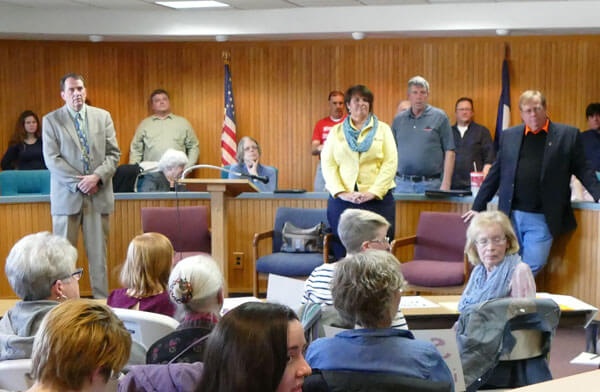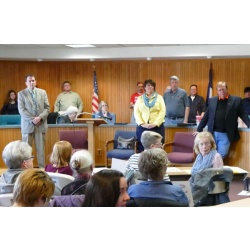
Here's what State Senator Michael Breitbach and State Representative Mike Bergan have to say about their reasons for voting for changes in laws governing collective bargaining by public employees

(Both State Senator Michael Breitbach and State Representative Michael Bergan in their most recent newsletters discussed their support of changes to Iowa's laws governing contract negotiations by public employees. In case you did not receive a copy of their newsletters, we're posting the relevant portions)
Michael Breitbach: "Prior to this bill, public entities and employees were required to negotiate for about 19 items. I will try and give a brief summary of what the new bill looks like. Public entities and employees will be required to negotiate for wages and other topics mutually agreed upon. There are items in the prohibited classes; they are (health) insurance, transfer procedures, leaves of absence for political purposes, supplemental pay, evaluation procedures, procedures for staff reduction, (union) dues checkoff and payroll deductions for political contributions and activities. Even though (health) insurance is not to be negotiated, it must be offered to all full time employees.
Topics mutually agreed upon may be bargained for if the public entity and employees agree. Examples are: hours, vacation, holidays, leaves of absence, overtime, shift differential, seniority and associated wage increases, benefits and/or other advantages, job classifications, health and safety matters, in-service training, grievance procedures (and other) topics mutually agreed upon.
The subcommittee and committee met on this bill last week. Public input on the bill lasted for over two hours and the committee meeting lasted two hours. Debate on this bill was interesting to say the least. The bill was called to the floor at about 3:00 p.m. Tuesday. Democrats filed over 60 amendments to the bill. Debate was suspended at 9:30 p.m. Tuesday. It resumed at 9:00 a.m. Wednesday and continued through the night until the final vote, 30 hours later at 3:00 p.m. Thursday.
Unfortunately, instead of having a meaningful discussion and constructive amendments, we were given speeches lasting 30 minutes or more about senator's families and history. We were informed that because we moved forward on this bill to give local control back to our counties, cities and school boards, we were destroying our state. The only option offered from the other side was to do nothing."
Mike Bergan: "Much of Chapter 20, originally implemented in 1975, has remained unchanged since 1981. There are no changes to the collective bargaining process and the steps in negotiation. Local elected and state officials will continue to have the opportunity and responsibility to bargain with employees in good faith and be in the position of balancing the needs and resources of their jurisdiction in the process.
Two significant points addressed by the bill's passage (that are) important to me include re-certification of the bargaining unit and the scope of consideration during arbitration. Re-certification of the bargaining unit will be done through elections held by employees to be represented. This process will help ensure the employees have choice in who represents them. Many bargaining groups were established 20, 30, or even 40 years ago, without real opportunity to change. This change allows employees to evaluate the effectiveness of their representation and to make a change if desired, on a periodic basis.
Secondly, the provisions for arbitration have been adjusted to re-balance the positions of the parties in the event negotiations and mediation are unsuccessful. The arbitration provision has been substantially unchanged since inception, but requirements for consideration of past bargaining agreements and the ability of governmental units to raise taxes have increasingly put public employers at a disadvantage in arbitration. It is important to note that there are few instances where arbitration is used, as it is the last resort in the process when negotiations and mediation steps cannot effect agreement.
Several changes proposed in HF 291 were amended. These changes were in response to concerns raised by constituents and reinforced during our debate on the floor. I raised concerns about provisions in the bill to Labor Committee Chair Representative Deyoe. Amendments were drafted and ultimately adopted to address several concerns (H-1096 and H-1101). The amendments modified provisions related to public safety employees units, restored (the phrase) "for proper cause" in the discharge of a public employee and addressed providing health insurance to full-time employees and the option to provide insurance to part-time employees.
Casting my vote in support of this bill to modify our public employee collective bargaining was a difficult decision. It is a policy bill that impacts public employees at the state and local level to varying degrees. It provides a framework for bargaining units to interact with our government representatives and to negotiate compensation and employment related matters. As the changes in the collective bargaining process are implemented, I place my trust and confidence in the individuals elected in our communities to negotiate terms that are in the best interest of all."
Site designed and maintained by Iroc Web Design Services©.
Your Small Business Web Design Solutions.™

